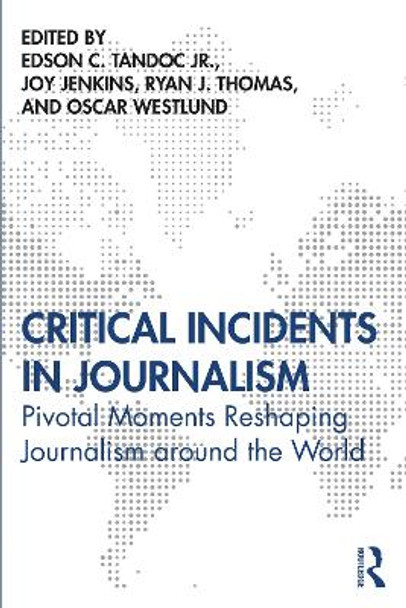Description
This edited collection examines critical incidents journalists have faced across different media contexts, exploring how journalists and other key actors negotiate various aspects of their work.
Ranging from the Rwandan genocide to the News of the World hacking scandal in the UK, this book defines a critical incident as an event that has led journalists to reconsider their routines, roles, and rules. Combining theoretical and practical analysis, the contributors offer a discussion of the key events that journalists cover, such as political turmoil or natural disasters, as well as events that directly involve and affect journalists. Featuring case studies from countries including Australia, Germany, Brazil, Kenya, and the Philippines, the book explores the discourses that critical events have generated, how journalists and other stakeholders have responded to them, and how they have reshaped (or are reshaping) journalistic norms and practices. The book also proposes a roadmap for studying such pivotal moments in journalism.
This one-of-a-kind collection is a valuable resource for students and scholars across journalism studies disciplines, from journalism history, to sociology of news, to digital journalism and political communication.
About the Author
Edson C. Tandoc Jr. is an Associate Professor at the Wee Kim Wee School of Communication and Information at Nanyang Technological University in Singapore. His research focuses on the sociology of message construction in the context of digital journalism. He has conducted studies on the construction of news and social media messages. His studies about influences on journalists have focused on the impact of journalistic roles, new technologies, and audience feedback on the various stages of the news gatekeeping process. This stream of research has led him to study journalism from the perspective of news consumers as well, investigating how readers make sense of critical incidents in journalism and take part in reconsidering journalistic norms; and how changing news consumption patterns facilitate the spread of fake news
Joy Jenkins is an Assistant Professor of digital journalism at the University of Tennessee School of Journalism and Electronic Media. Her research uses a sociological approach to examine changing organizational identities and practices in newsrooms, with a particular focus on local media. Jenkins is also a research associate at the Reuters Institute for the Study of Journalism at the University of Oxford.
Ryan J. Thomas is an Associate Professor of Journalism Studies at the University of Missouri's School of Journalism. His research program addresses the intersection of journalism ethics and the sociology of news, focusing on journalism amid processes of change: the forces shaping journalism, how journalists make sense of them, and how these changes affect journalism's institutional obligations and role in public life. His research has been published in such journals as Journalism Studies, Digital Journalism, the Journal of Media Ethics, Journalism Practice, and New Media & Society
Oscar Westlund is a Professor at the Department of Journalism and Media Studies at Oslo Metropolitan University, where he leads the OsloMet Digital Journalism Research Group. He holds secondary appointments at Volda University College and University of Gothenburg. He is the Editor-in-Chief of Digital Journalism. He leads the epistemologies of digital news production, a research project funded by the Swedish Foundation for Humanities and Social Sciences. He is a project member of the international research project Source Criticism and Mediated Disinformation (2020-2024). His most recent book is What is Digital Journalism Studies? (Routledge, 2020), co-authored with Steen Steensen.
Reviews
"This timely volume authoritatively develops the idea of the critical incident as a key sensitizing concept in journalism studies. The book offers a rigorous conceptualisation, followed by a truly global and diverse range of case studies - from the Hong Kong demonstrations to the Rwandan genocide. In opening up for new ways of seeing journalism, the book stands as both an invaluable contribution to knowledge and indispensable reading for students and scholars of journalism."
Professor Karin Wahl-Jorgensen, Cardiff University
"A book that offers fresh perspectives on critical incidents in journalism was long overdue and Joy Jenkins, Edson C. Tandoc Jr., Ryan J. Thomas, and Oscar Westlund are perfectly placed to competently and authoritatively lead such an ambitious global endeavor. Using meticulous research, rigorous analysis and influential scholarship, their volume presents new methodological and theoretical directions that will undoubtedly help shape the future of journalism studies."
Professor Bruce Mutsvairo, Auburn University
Book Information
ISBN 9780367895341
Author Edson Tandoc Jr.
Format Paperback
Page Count 264
Imprint Routledge
Publisher Taylor & Francis Ltd
Weight(grams) 440g





![Today's Moment Of Joy: Lined Journal Notebook - Create and Remember Every Happy Moments, Journal With 120 Pages of Joy - Mindfulness and Happiness Workbook by Millie Zoes 9781906431389 [USED COPY] Today's Moment Of Joy: Lined Journal Notebook - Create and Remember Every Happy Moments, Journal With 120 Pages of Joy - Mindfulness and Happiness Workbook by Millie Zoes 9781906431389 [USED COPY]](https://cdn11.bigcommerce.com/s-zkx5lhzlf8/images/stencil/444x444/products/5986570/6063596/9781906431389__40911.1730346015.jpg?c=1)


